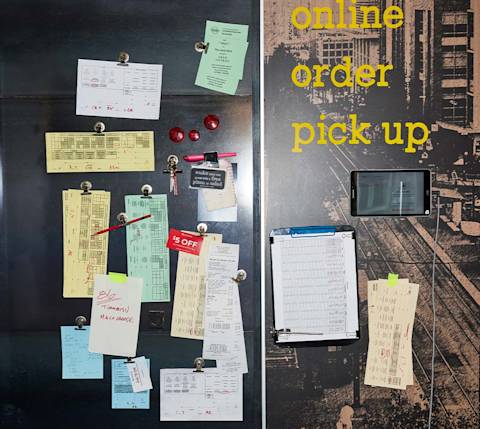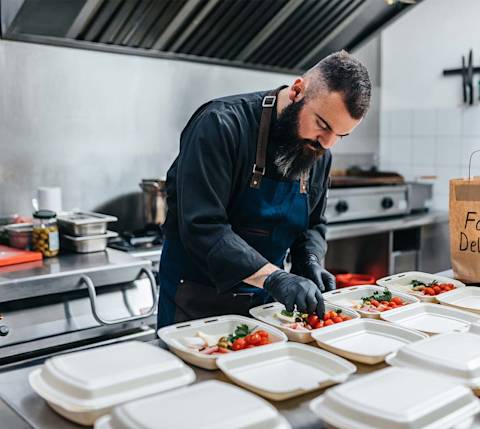From developing seasonal dishes to focusing on new revenue streams, there are many strategies you can take to optimize operations and increase customer orders during the slow restaurant season. These tactics will help you establish a successful plan for winter restaurant operations, and the downloadable Restaurant Winter Readiness Checklist offers an easy-to-reference overview to help you prepare for the shift in seasons.
1. Maximize your team’s effectiveness
Ensure your team is properly set up to flourish throughout the winter with strategies to boost wellness, educational goals, and operational stability.
Invest in employee wellness
Maintaining employee wellness is crucial in the fast-paced, high-pressure restaurant industry. Making the mental health of your team members a priority involves creating an environment that fosters excitement and motivation for work each day. A proactive wellness strategy involves implementing regular check-ins, offering mental health days, cultivating team unity, and organizing staff meals. Ensure your team feels valued by recognizing their hard work with fun wellness activities.

"We are really focusing on the overall well-being of our employees. To do this, we regularly schedule leisurely activities outside of the workplace, such as sports events, yoga, and meditation, and have just begun a new initiative where our HR director visits each location."
Evaluate employee hours and holiday staffing
Due to the amount of holidays and variability of seasonal bookings, properly staffing and adjusting employee hours can be challenging. Monitoring and adjusting employee shifts or potentially implementing an on-call system can ensure proper coverage, especially if you offer outdoor winter dining.
Offer comprehensive training
Give high-potential employees a clear path to career growth through internal training and development programs that help them rise up the ladder. Consider cross-training your employees to handle different roles within the restaurant. That way, if certain team members call in sick or cannot make it due to inclement weather, other staff members can step in and keep things running smoothly.

2. Design a seasonal food menu
Take advantage of seasonal produce with a winter menu that entices your customers with nostalgic, hearty comfort food. In colder geographical locations, winter is also a time when customers might be more inclined to indulge in decadent desserts and a variety of hot beverages like mulled wine.
3. Develop a winter marketing plan
Prepare for the slower season by maximizing your marketing efforts to try and increase customer engagement. By following these key best practices, you will be better positioned to retain a loyal customer base through the slower months.
Strengthen your online strategy
Take the time to make sure your website is up to date, as it influences diners' decisions whether to dine in or place a delivery order. Use email marketing to keep in touch with regular diners about the latest updates. And consistently show your commitment to customer satisfaction by responding to new reviews when they are added.
Highlight outdoor winter dining on social media
Use your social media platforms to share photos and descriptions of your winter seasonal offerings and any outdoor restaurant tents or outdoor dining areas.
Add alcohol to your delivery menu
Alcohol is a profitable source of revenue for restaurants. Include alcoholic beverages in your delivery options if licensing allows, and also get creative with seasonal food and beverage pairings.
Reach more delivery customers with ads and promotions
Reach a broader pool of potential delivery customers by advertising on DoorDash with Sponsored Listings, or offer promotional discounts to attract new and repeat guests.
4. Improve profitability during the restaurant slow season
Profit margins are always top of mind for restaurants. Since the slowest months for restaurants often take place during the winter, particularly in locales with the most extreme temperature fluctuations, exploring innovative strategies to leverage customer preferences amidst dynamic marketing conditions and shifting consumer trends is crucial.

Expand your dining area footprint
According to one major study, 40% of respondents maintained that an outdoor dining area would make them likelier to choose one restaurant over a similar one. If space allows, consider investing in insulated outdoor restaurant tents to expand your seasonal dining options. Be sure to also invest in quality outdoor heaters to maintain a comfortable and inviting temperature.
Brainstorm ways to reduce costs
Look closer at your deals with suppliers to see if you can negotiate a better price, or find ways to minimize food wastage. Undertaking a menu analysis and gaining a deeper understanding of your business's profit and loss (P&L) statement can help you find cost efficiencies to increase your overall profitability.
Set up online ordering
Easily offer commission-free online ordering to your customers directly from your own website with Online Ordering, which is included in every DoorDash partnership. Share your Online Ordering link on your website, social media, Yelp, and Google Business pages to drive pickup and delivery orders with no monthly fees or commissions. Businesses pay payment card processing fees of 1.75% of the total transaction amount + AU$0.30 per order. On pickup orders there are no other fees. On delivery orders, you pay AU$5.50 per delivery to DoorDash to fund the cost of a Dasher delivering the order.

"The biggest bonanza of Online Ordering is that it's commission-free. I mean, you can’t beat it."
Launch a loyalty program
Encourage repeat sales by offering a customer loyalty program with customized rewards for continued support. Options can include free items or discounts after a certain number of purchases.
5. Optimize delivery operations
Customers may be less inclined to visit restaurants during winter due to weather conditions. However, this presents an opportunity to increase delivery and takeout orders. Here are tips for optimizing your restaurant’s operations to manage traffic and ensure safety.
Optimize the flow of diners, pickup customers, and Dashers
Just because it’s the restaurant slow season doesn’t mean there isn’t the potential for crowding inside the restaurant. Maintain clear signage to guide customers and Dashers to the appropriate location. A designated entrance or counter area for efficient pickup and handoff of delivery orders will maximize efficiencies in your restaurant.
Establish special parking for curbside pickup
When consumers order meals to go, many opt for curbside pickup. If possible, allocating designated parking spaces for curbside pickup ensures fast and safe order retrieval.

Optimize food quality for off-premise orders
An effective strategy to boost sales is to optimize your delivery menu by highlighting dishes that travel well. Enhance customer appeal with enticing photos and detailed descriptions, and promote upsells and add-ons to boost sales. When selecting takeout packaging, choose durable, leak-proof, and eco-friendly containers to help prevent sogginess or spills during transport. To ensure accuracy and completeness in customer orders, establish a straightforward and comprehensive packing process for staff to adhere to.
Start preparing for winter now
Despite the challenges winter brings, the season is also an opportunity to implement strategies that keep customers satisfied and your business bustling. Whether it’s developing a winter restaurant operations marketing plan, maximizing team effectiveness, or increasing social media visibility, you can proactively prepare for a successful winter.
Looking for more tips to keep business booming during the restaurant slow season? Download our Restaurant Winter Readiness Checklist for actionable tips to help you prepare for winter.





